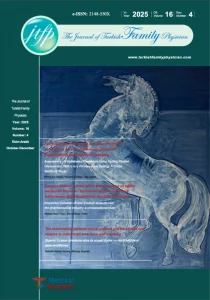Evaluation of the stigma level related to chronic disease in diabetes and hypertension patients
Introduction and Aim: The two most common chronic diseases in primary care chronic disease follow-up are diabetes (DM) and hypertension (HT). The aim of this study is to evaluate the level of chronic disease stigma, perceived social support and depression in DM and HT patients, and to examine their effects on treatment regulation.
Materials and Methods: A single-center, descriptive study was conducted with randomly selected 50 DM and 50 HT patients who applied to a Family Health Center between September and December 2020. Patients with DM were divided into regulated and non-regulated groups according to HbA1c level, and HT patients according to target cytolic/diastolic arterial pressure.The level of stigmatization with the Expected Stigma Scale in Chronic Diseases (CIASS), psychological health status with the Patient Health Questionnaire-9 Scale (PHQ-9), and perceived social support status with the Multidimensional Scale of Perceived Social Support (MSPSS) were questioned face-to-face. SPSS program was used in the analysis of the data.
Results: One hundred patients with a mean age of 56.4±11.4 years and a diagnosis period of 10.4±7.2 years were included in the study. Stigma levels of patients with unregulated DM (38.0%) and unregulated HT (14%) were compared. DM patients had higher total expected stigma score of chronic diseases (p=0.001), related to work life (p<0.001) and healthcare workers (p=0.007). In the linear regression analysis, it was determined that the current depression level of the patient is the determinant of the level of stigma in chronic diseases in both HT patients (F = 4.073, p=0.012, R² = 0.21) and DM patients (F = 3.154, p =0.012, R² = 0.30).
Discussion and conclusion: The level of chronic disease stigma was found to be higher in DM patients than in HT patients, and the rate of treatment regulation was lower. The role of depression level, expected stigma level from work environment and healthcare professionals were pointed out in the regulation of DM.
References
- Earnshaw VA, Quinn DM, Kalichman SC, Park CL. Development and psychometric evaluation of the chronic illness anticipated stigma scale. Journal of behavioral medicine 2013;36(3):270-82.
- Yilmaz A, Dedeli O. Assessment of anxiety, depression, loneliness and stigmatization in patients with tuberculosis. Acta Paulista de Enfermagem 2016;29:549-57.
- Famoroti TO, Fernandes L, Chima SC. Stigmatization of people living with HIV/AIDS by healthcare workers at a tertiary hospital in KwaZulu-Natal, South Africa: a cross-sectional descriptive study. BMC medical ethics 2013;14(1):1-10.
- Alpsoy E, Şenol Y, Bilgiç Temel A, Baysal GÖ, Akman Karakaş A. Psoriasisde içselleştirilmiş stigmatizasyon (damgalanma) ölçeğinin güvenirlik ve geçerlik çalışması. TÜRKDERM-Deri Hastalıkları ve Frengi Arşivi 2015;49(1):45-9.
- Kurzban R, Leary MR. Evolutionary origins of stigmatization: the functions of social exclusion. Psychological bulletin 2001;127(2):187.
- Steward WT, Herek GM, Ramakrishna J, et al. HIV-related stigma: adapting a theoretical framework for use in India. Social science & medicine 2008;67(8):1225-35.
- Leventhal H, Halm E, Horowitz C, Leventhal EA, Ozakinci G. Living with chronic illness: A contextualized, self-regulation approach. The Sage handbook of health psychology. 2004:197-240.
- Earnshaw VA, Quinn DM. The impact of stigma in healthcare on people living with chronic illnesses. Journal of health psychology 2012;17(2):157-68.
- Thoits PA. Stress and health: Major findings and policy implications. Journal of health and social behavior 2010;51(1 suppl):41-53.
- Akman M, Civek S. Dünyada ve Türkiye’de kardiyovasküler hastalıkların sıklığı ve riskin değerlendirilmesi. The Journal of Turkish Family Physician 2022;13(1):21-8.
- Korkmaz SA, Topbaş E. Böbrek sağlığının korunması ve böb-rek hastalıklarının önlenmesinde ulusal ve uluslararası eylem planları/national and international action plans in protecting kidney health and preventing kidney diseases. Nefroloji Hemşireliği Dergisi 2023;18(1):45-61.
- Doğaner YÇ, Aydoğan Ü. Which hypertension guideline and threshold values? New thresholds in hypertension. Turkish Journal of Family Practice 2019;23(2):78-84.
- Joachim GL, Acorn S. Living with chronic illness: The interface of stigma and normalization. Canadian Journal of Nursing Research Archive 2000;32(3):37-48.
- Tünerir E. Kronik hastalıklarda beklenen stigma ölçeğinin Türkçe geçerlilik ve güvenilirlik çalışması. Uzmanlık Tezi. TC. SBÜ İstanbul Eğitim ve Araştırma Hastanesi, Nöroloji Anabilim Dalı, 2019.
- Bland JM, Altman DG. Statistics notes: Cronbach’s alpha. Bmj 1997;314(7080):572.
- Sari YE, Kokoglu B, Balcioglu H, Bilge U, Colak E, Unluoglu I. Turkish reliability of the patient health questionnaire-9. Biomedical Reserch-India 2016;27:460-2.
- Eker D, Arkar H. Çok boyutlu algılanan sosyal destek ölçeğinin faktör yapısı, geçerlik ve güvenirliği. Türk Psikoloji Dergisi 1995;10(34):45-55.
- Zimet GD, Powell SS, Farley GK, Werkman S, Berkoff KA. Psychometric characteristics of the multidimensional scale of perceived social support. Journal of personality assessment 1990;55(3-4):610-7.
- Almutairi AF, Adlan AA, Balkhy HH, Abbas OA, Clark AM. “It feels like I’m the dirtiest person in the world.”: exploring the experiences of healthcare providers who survived MERS-CoV in Saudi Arabia. Journal of infection and public health 2018;11(2):187-91.
- Ingram JA, Ohan JL, Bebbington K. Diabetes stigma predicts higher HbA1c levels in Australian adolescents with type 1 diabetes. Stigma and Health 2022;7(4):454-60.
- Budhwani H, De P, Sun R. Perceived Stigma in Health Care Settings Mediates the Relationships Between Depression, Diabetes, and Hypertension. Population Health Management 2022;25(2):164-71.
- Lee S-M, Lim L, Koh D. Stigma among workers attending a hospital specialist diabetes clinic. Occupational Medicine 2015;65(1):67-71.
- Kato A, Yamauchi T, Kadowaki T. A closer inspection of diabetes-related stigma: why more research is needed. Diabetology international 2020;11(2):73-5.
- Abel WM, Spikes T, Greer DB. A qualitative study: Hypertension stigma among black women. The Journal of cardiovascular nursing 2021;36(2):96.
- Idemudia ES, Olasupo MO, Modibo MW. Stigma and chronic illness: A comparative study of people living with HIV and/or AIDS and people living with hypertension in Limpopo Province, South Africa. Curationis 2018;41(1):1-5.
- Ayşegül K, Tok HH. İçselleştirilmiş damgalanma, algılanan sosyal destek ve bağımlılık boyutları arasındaki ilişki tercih maddesine göre değişir mi? Anadolu Psikiyatri Dergisi 2020; 21(6):609-16.
- Gredig D, Bartelsen Raemy A. Diabetes related stigma affects the quality of life of people living with diabetes mellitus in S witzerland: implications for healthcare providers. Health & social care in the community 2017;25(5):1620-33.



